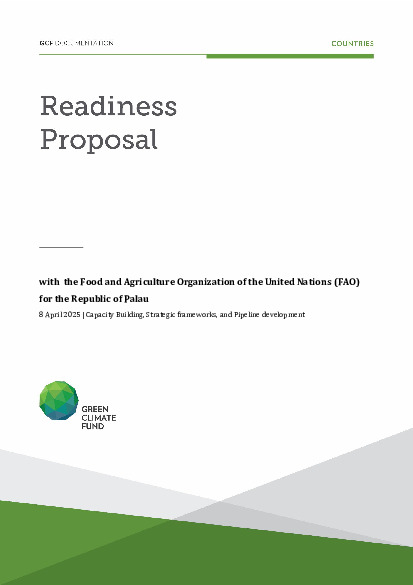Developing an enabling environment for low emission and climate smart and resilient agriculture in Palaund Energy Reforms to Build Climate Resilience

Developing an enabling environment for low emission and climate smart and resilient agriculture in Palaund Energy Reforms to Build Climate Resilience
This Readiness Proposal aims to address the following barriers: i) lack of financial resources; ii) lack of technical capacity to identify and develop climate action projects/programmes and to improve the legislative framework, (iii) insufficient updated quantitative and qualitative information, iv) low levels of stakeholder engagement; v) disjointed/siloed government policies and frameworks.
This Readiness proposal will (i) develop an agriculture policy and strategy, (ii) strengthen national capacities and develop an appropriate legislative framework for climate resilient agriculture in the Ministry of Agriculture, (iii) build the baseline data and information through studies and stakeholder consultations, (iv) develop concept notes to enable Palau to access additional climate finance to implement climate actions, and (v(iii) co-design with the most vulnerable communities a transformative vision and corresponding solutions for low emission and climate smart and resilient agriculture through an enhanced enabling environment with strategic frameworks, technical capacities, data, and stakeholder coordination mechanisms. This will allow Palau’s agriculture sector, and the most vulnerable communities to effectively cope with soaring climate change challenges and achieve food security.
The Palauan government, specifically the Ministry of Finance, Ministry of Agriculture, Fisheries, and the Environment, the Office of the Attorney General under the Ministry of Justice, and the Ministry of Human Resources, Culture, Tourism & Development, will directly benefit from a portfolio of transformative solutions co-designed with local communities. Indirect beneficiaries will include Palau's farmers and most vulnerable populations (including men, women, children and people with disability), who will benefit as this project’s outcomes will contribute to a climate resilient future and have a greater say in decision making by collaboratively shaping a vision and solutions for a climate-resilient future. These vulnerable groups include men and women farmers, fishers, and coastal dwellers in rural, peri-urban, and low-lying areas across Palau’s islands.